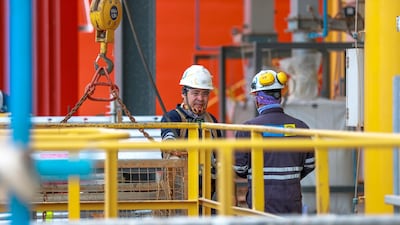New residency visa rules that will allow key professional workers to live in the UAE long-term have been described as a game changer for the economy.
Management experts and recruiters likened the 10-year visa allowance for those in medicine, science, research, engineering and technical fields to the Green Card in the United States, but caution was urged as much of the system is yet to be set out.
The UAE cabinet approved a raft of amendments to the residency status of students, entrepreneurs and professionals working in select industries on Sunday night. The changes are expected to be in place by the end of the year.
The measures announced by the Cabinet on Sunday night include visas of up to 10 years for specialists working in the fields of medicine, science, research and technical fields – in addition to their families.
Foreign investors setting up companies could also secure visas of up to 10 years, while students would be given leave to stay for five years, or 10 years if they are 'exceptional', under the changes to the residency visa system.
The news has been welcomed by industry watchers, who say the plans will create additional stability in the market by encouraging professionals to settle here long term.
“Over time, those who have a deep knowledge not only of their area of expertise, but also of living and working in the UAE, will drive high standards in their respective industries,” said a partner in employment law at Clyde & Co in Dubai.
“In addition, entry-level staff will be able to benefit from the expertise of those senior individuals.”
And employers will in turn receive greater choice from the larger pool of talent already present in the country, said experts.
“This clearly gives UAE edge over other GCC countries to attract and retain professional talent,” said Vijay Gandhi, regional director for the Middle East at Korn Ferry Hay Group.
“Investors in SME businesses will be welcoming this move as 100 per cent investment opportunities will give a real boost to the capital they can now invest in the business.”
Atif Rahman, director and partner, Danube Properties agreed, saying the changes will boost investor confidence.
“This landmark decision will change the economic landscape of the region as we expect other countries to follow the trend set by the UAE,” he added.
The visas will be for residency, as opposed to employment, said the UAE Cabinet, which is a significant change as residency visas are currently tied to a person’s employment status.
This means it would operate more like the green card – a permit which is typically renewed every 10 years that allows foreign workers to live and work in the United States.
______________
Read more:
UAE's new visa regulations: what we know
Sheikh Mohammed announces sweeping changes to UAE's visa system
Residency changes could open the floodgates to property sector, say experts
UAE foreign ownership changes will boost FDI, spur economic growth
______________
Recruiters were quick to point out that more detail was needed on the changes with respect to what happens when someone holding a 10-year residency visa holder moves jobs, or loses their job.
Mohammad Osama, managing director of the Gulf Recruitment Group, said the changes raise several questions.
“One is, if you have this 10-year visa and now someone wants to employ you, do you move onto their visa? Or do you keep your own visa?”
“Is this 10-year visa independent of your job? That’s the question. I think it’s going to be independent of your employer. But I don’t know what will happen if you become employed – will that visa be converted? That’s not very clear,” added Mr Osama.
It is also not clear what will happen if the employee loses their job, he said.
They will still need the means to be able to pay for their rent, mortgage or sustain their lifestyle to remain in the UAE, he added.
“Very few people will be living in their own properties that are fully paid off because even if you own it, it will definitely be on a mortgage and you won’t be able to pay the mortgage if you don’t have a salary. The sustainable time is still only going to be a few months. You cannot live here without a job. So it won’t make a massive difference, as such,” said Mr Osama.
David Mackenzie, managing director of Mackenzie Jones Group, one of the largest independent recruitment groups in the GCC, said the news was good for the UAE.
The company often has difficulty in recruiting for engineering roles – which are included in the changes – and the changes will help attract more people working in the professions tied to the new visas, he said.
“As an employer if I was a hospital here I would be attracting cardiologists from around the world with the view that we can give you a 10-year visa," said Mr Mackenzie.
"It is similar to the Green Card in the States."
Mr Mackenzie said the visa changes will be key in making the UAE more attractive. But the increasing cost of living could still put some professionals off moving here.
“It is becoming more and more expensive. And it is not just the cost of living it’s schools,” he said.
“If you are from India or the UK we have very good education systems that are free, often. If you are bringing a family of four here it can be prohibitively expensive, especially if your wife or husband doesn’t work.”



